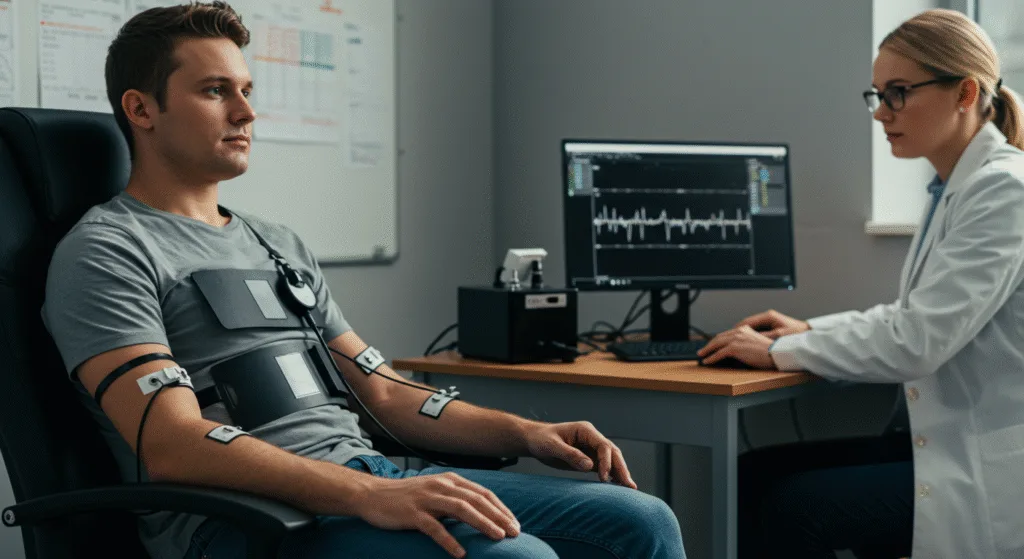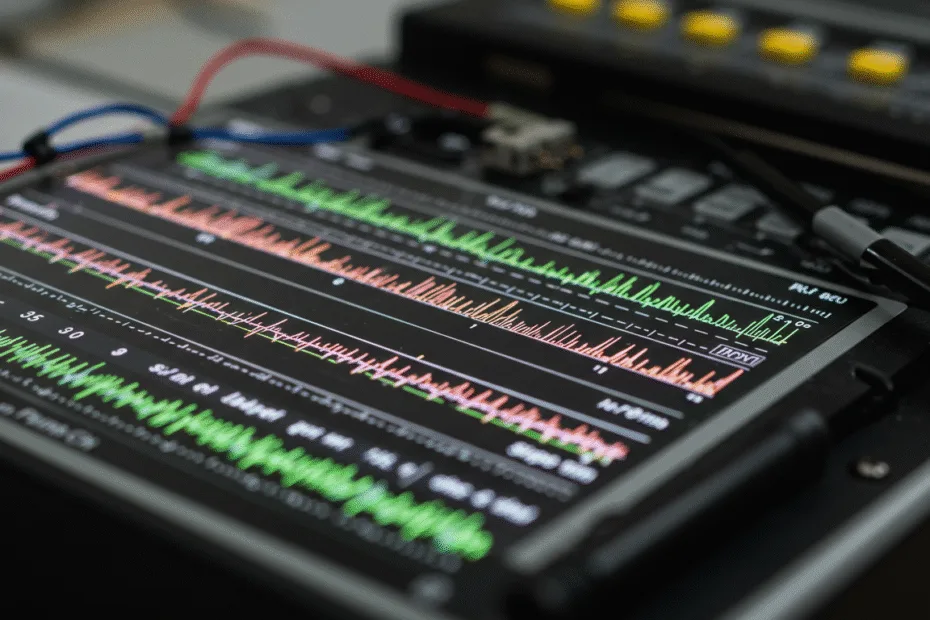Polygraph Test: Truth Behind the Lie Detector Machine.
Discover how polygraph tests work, their accuracy, legal use, and controversies across the globe, including Pakistan, China, and more.
What Is a Polygraph Test?
A polygraph test, often called a lie detector test, is a method used to assess whether someone is being truthful or deceptive. It works by measuring physiological responses such as heart rate, blood pressure, respiration, and skin conductivity while a subject answers a series of questions.
Although not foolproof, polygraphs are still widely used in various fields including law enforcement, national security, and private investigations.
How Does a Polygraph Work?
The polygraph machine records several key physiological signals:
- Cardiovascular activity via a blood pressure cuff
- Respiratory rate using pneumographs
- Electrodermal activity (EDA) through finger sensors
During the exam, subjects answer a mix of relevant, control, and irrelevant questions. The examiner then compares the physiological reactions to determine if deception is likely.
Scientific Validity and Accuracy of Polygraph Tests
While some studies suggest polygraphs can be up to 90% accurate under controlled conditions, real-world results are less reliable due to factors like stress, anxiety, and countermeasures.
Despite this, many organizations continue to rely on polygraphs for investigative purposes, especially when corroborated with other evidence.
Legal Use of Polygraphs Around the World
The admissibility of polygraph results varies significantly from country to country. Some nations allow them in limited contexts, while others reject them entirely in courtrooms.
Let’s explore how different countries approach polygraph testing.
Polygraph Laws in Specific Countries
United States
In the U.S., polygraph results are generally not admissible in federal courts unless both parties agree. However, they are frequently used during pre-employment screenings for government jobs, particularly in agencies like the FBI, CIA, and NSA.
Private employers must follow the Employee Polygraph Protection Act (EPPA) , which restricts polygraph use in most industries.
Canada
Canada does not accept polygraph results as evidence in criminal trials. However, law enforcement and intelligence agencies may use them internally during investigations.
Some provinces regulate polygraph usage for private employers, requiring informed consent and limiting the scope of questioning.
India
In India, polygraph tests are not considered valid evidence in court under the Indian Evidence Act. However, the Supreme Court has allowed their use in specific cases with the subject’s consent.
Polygraphs are commonly used by police and investigative agencies like the CBI and NIA to assist in solving complex cases.
United Kingdom
The UK does not recognize polygraph tests in court. However, the government uses them for monitoring sex offenders on parole and in certain intelligence-related employment screenings.
Private polygraph services are available but have no legal standing.
China
China employs polygraph testing in criminal investigations, although it is not legally binding. Law enforcement agencies use polygraphs as part of broader interrogation techniques.
There is growing interest in adopting newer technologies like brain scanning and voice analysis alongside traditional polygraphs.
Russia
In Russia, polygraph exams are used in internal security and intelligence sectors. While not admissible in court, they are employed for vetting candidates applying for sensitive positions in the military and law enforcement.
Russian researchers have also explored integrating polygraph data with AI-based behavioral analysis systems.
Saudi Arabia
In Saudi Arabia, polygraph tests are occasionally used in criminal investigations, particularly in high-profile cases involving national security. They are not admissible in court but serve as an auxiliary tool for interrogations.
Religious and cultural norms influence how lie detection tools are applied in the justice system.
UAE
The UAE allows polygraph testing in investigative procedures, especially in Dubai and Abu Dhabi. The Dubai Police Department uses polygraphs in major criminal and corporate investigations.
While not admissible in court without additional evidence, they are accepted as supportive tools in determining truthfulness.
South Africa
South Africa permits polygraph testing with voluntary consent. Employers and law enforcement agencies use them in pre-employment screening and criminal investigations.
However, results are not automatically accepted in court and require judicial approval.
Brazil
In Brazil, polygraph tests are not considered scientific proof and are not admissible in court. However, they are sometimes used during police investigations and internal corporate inquiries.
There are ongoing debates about regulating polygraph usage to prevent abuse and ensure ethical standards.
Australia
Australia does not accept polygraph results as courtroom evidence. However, some law enforcement agencies use them during missing persons and sexual offense investigations.
Private polygraph services are available, but their outcomes are not legally recognized.
Japan
Japan rarely uses polygraph testing due to concerns about its scientific reliability. Most investigations rely on confessions and forensic evidence.
Some private firms offer polygraph services for personal or corporate use, but they hold no legal weight.
Pakistan – Polygraph Testing in South Asia
In Pakistan, polygraph testing is not officially recognized by the judiciary as evidence in court. However, similar to India, there have been instances where courts have permitted polygraph examinations with the consent of the accused.
Usage in Pakistan:
- Law Enforcement: Used by FIA, CID, and anti-terrorism units in select cases.
- Private Sector: Available through licensed forensic centers, primarily for employee screening.
- Military and Intelligence Agencies: May use polygraphs for vetting personnel.
Legal Status:
Under Pakistani law, polygraph results cannot be used independently in court. However, the Supreme Court of Pakistan has acknowledged the potential utility of polygraphs in aiding investigations, provided they are conducted ethically and with consent.
Ethical Concerns:
Human rights groups in Pakistan have raised concerns about the misuse of polygraph tests in custodial settings, calling for stricter regulations and oversight.
Common Myths About Polygraph Testing
| Myth | Reality |
| Polygraphs always tell the truth | No – they can produce false positives/negatives |
| Only guilty people fail | Innocent people can fail due to stress or misunderstanding |
| You can’t beat a polygraph | Some countermeasures can alter physiological responses |

How to Prepare for a Polygraph Test
If you’re scheduled for a polygraph exam, consider the following tips:
- Get enough sleep
- Avoid stimulants like caffeine or alcohol
- Understand the questions beforehand
- Stay calm and breathe naturally
- Be honest and direct in your answers
Remember: If you’re telling the truth, there’s no reason to panic.
Ethical and Privacy Concerns
Polygraph testing raises important ethical and privacy issues, including:
- Invasive physiological monitoring
- Potential coercion or manipulation
- Misuse in workplace settings
- Lack of standardized regulation
Many critics argue that polygraphs infringe on civil liberties and should only be used with full informed consent.
Alternatives to Polygraph Testing
Researchers are exploring new methods of detecting deception, including:
- fMRI (Functional Magnetic Resonance Imaging) – detects brain activity related to lying
- EEG (Electroencephalography) – measures electrical brain patterns
- Voice Stress Analysis – identifies vocal stress indicators
- Microexpression Detection – analyzes facial expressions for hidden emotions
These alternatives are still evolving and not yet widely adopted.
Cost of a Polygraph Test
The average cost of a polygraph test varies globally:
| Country | Average Cost Range |
| USA | $200–$1,000+ |
| Canada | CAD 300–800 |
| India | ₹5,000–₹20,000 |
| UAE | AED 1,000–3,000 |
| Pakistan | PKR 20,000–50,000 |
| UK | £200–£600 |
Prices depend on the complexity of the case, location, and examiner credentials.
Conclusion: Is the Polygraph Still Relevant?
Despite its limitations, the polygraph test remains a widely used tool in investigative practices around the world. From the United States to Pakistan, governments and private institutions continue to rely on polygraphs for truth verification, even if their legal validity is questionable.
As technology advances, we may see newer and more accurate methods emerge. Until then, the polygraph remains a controversial yet compelling instrument in the pursuit of truth.
FAQs About Polygraph Tests
Q1: Can medications affect polygraph results?
Yes, medications affecting heart rate, blood pressure, or nervous system function can impact results.
Q2: Are polygraph tests admissible in court?
Generally not, unless both parties agree to their use.
Q3: How long does a polygraph test take?
Typically between 1.5 to 3 hours, including interviews.
Q4: Can you pass a polygraph if you’re lying?
Some individuals may manipulate results using countermeasures, though success varies.
Q5: Is the polygraph 100% accurate?
No. Accuracy ranges from 70% to 90%, depending on conditions and examiner skill.
Final Thoughts
From the United States to Pakistan, the polygraph test continues to be a fascinating blend of science, psychology, and controversy. Whether you’re preparing for one or simply curious about its global applications, understanding how it works—and its limitations—can empower you with knowledge.
As we seek better ways to uncover the truth, the polygraph stands as both a symbol of our desire for certainty and a reminder of the complexities of human behavior.
Read This Article: Criminal Profiling Investigations in Pakistan

